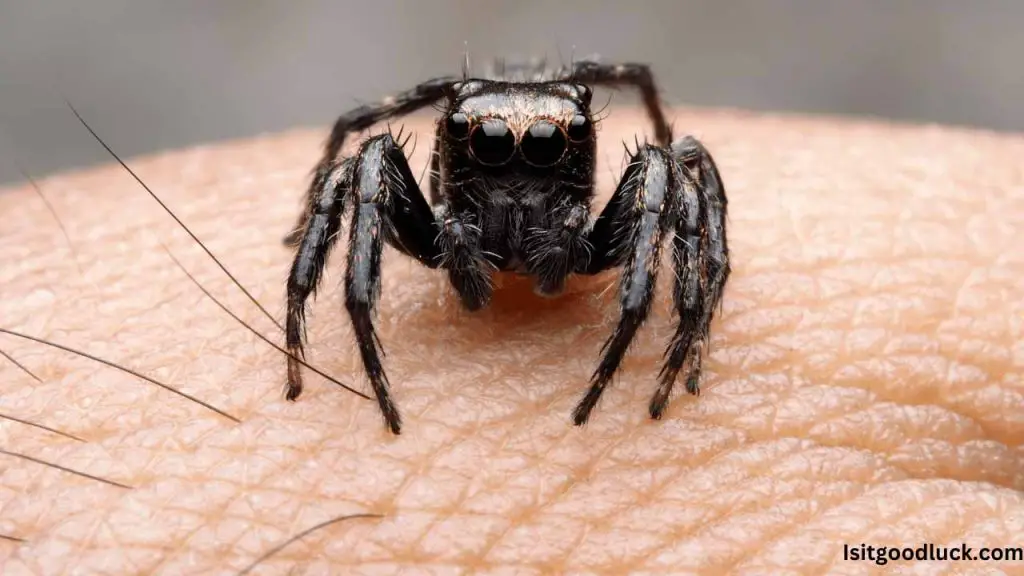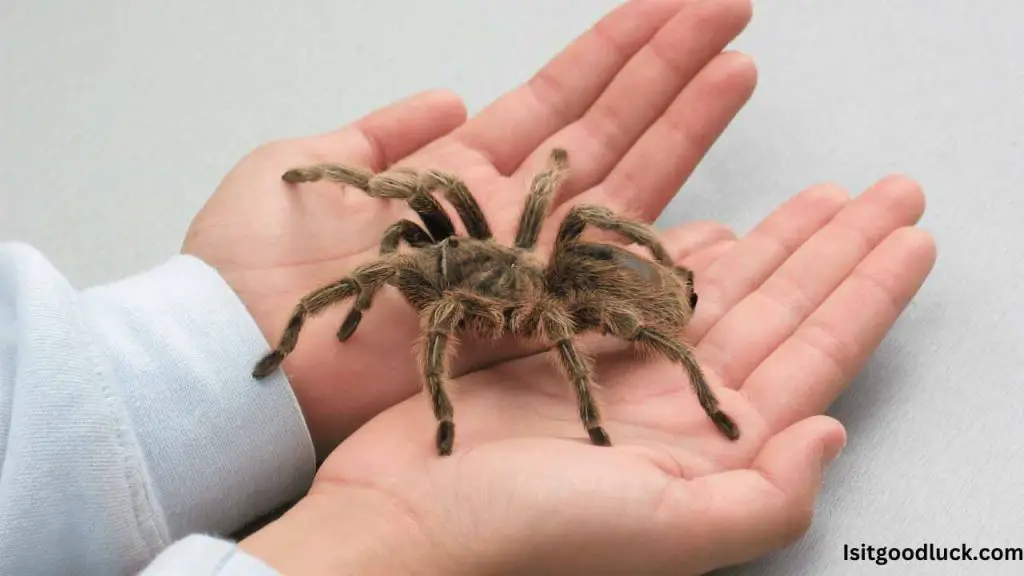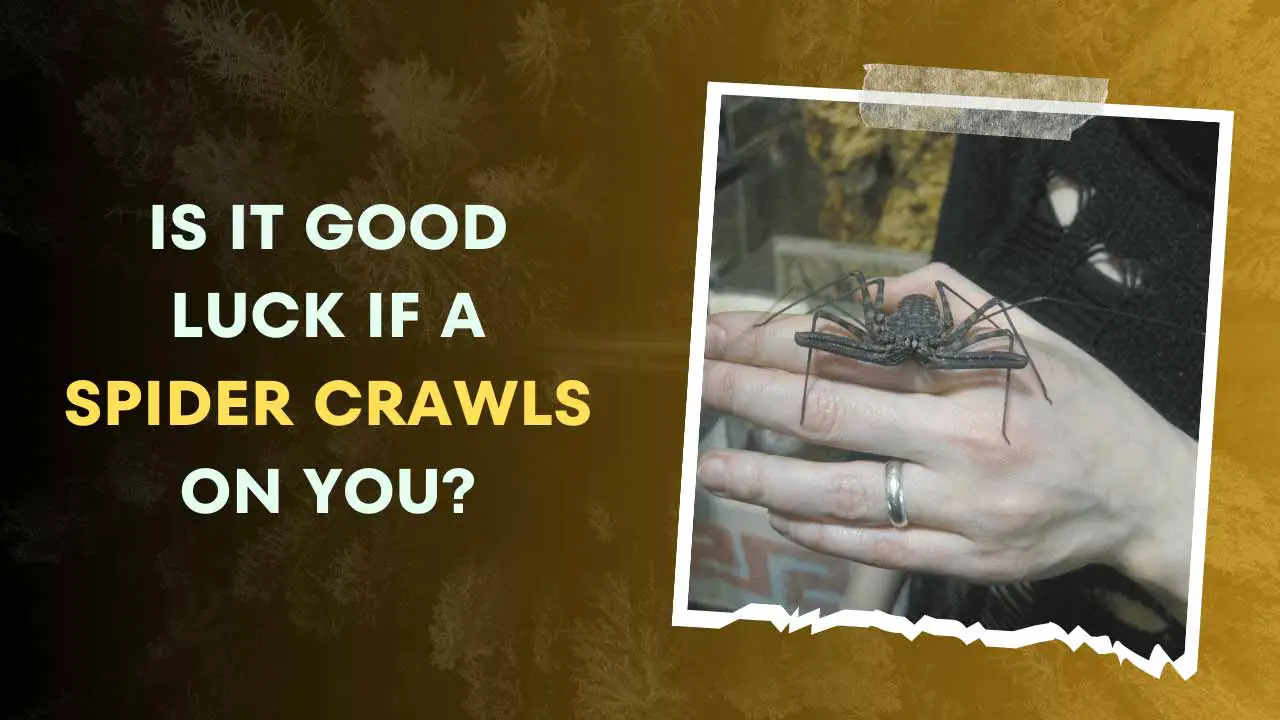When a spider waltzes across your arm, your initial reaction might be a shudder followed by an attempt to flick it away.
However, numerous cultures worldwide encourage us to hold fire and let the arachnid continue its path, associating such encounters with impending good fortune.
This article will unpack this superstition’s roots and interpretations, exploring the symbolism of spiders and the possible reasons why such beliefs have persisted throughout history.
Contents
- 1 Is it Good Luck If a Spider Crawls on You?
- 2 The Cultural Tapestry of Spider Symbolism:
- 3 Scientific Perspective on Spider Crawling and its Good Luck:
- 4 Psychological Aspect on This Superstition:
- 5 Conclusion:
- 6 FAQs
- 6.1 Q: Which spiders are associated with good luck?
- 6.2 Q: Where did the superstition about spiders bringing good luck originate?
- 6.3 Q: Is there any scientific explanation for why people believe in the superstition about spiders bringing good luck?
- 6.4 Q: What are the psychological reasons why some people are afraid of spiders?
- 6.5 Q: How can someone deal with a fear of spiders?
Is it Good Luck If a Spider Crawls on You?
Unquestionably, many find spiders unsettling. Their eight legs, the way they move, and their evil reputation make them the stuff of nightmares for some.
Despite this widespread aversion, in surprising contrast, folklore in various parts of the world maintains that if a spider crawls on you, it’s a sign of prosperity and good fortune.
This belief seems to have originated in England, where a chance meeting with the harmless money spider, a small, brown species, signified financial windfall. Tradition is also rooted in Chinese traditions, where spiders symbolize wealth and prosperity.
Also read: Is It Good Luck To Be Stung by a Bee?
These are not the only cultures associating spiders with good luck; the details can vary significantly. For instance, a spider crawling across your hand is rumored to indicate imminent monetary gain.
If a spider descends from the ceiling and lands on you, it’s a harbinger of good fortune. Stumble upon your initials woven into a spider’s intricate web, and it’s believed you’ll enjoy years of good luck.
However, it’s not all good news in the spider world. In Japan, a spider traversing your face is seen as a death omen. At the same time, certain regions in the United States believe that sighting a spider on the unfortunate date of Friday the 13th is a signal of impending misfortune.

The Cultural Tapestry of Spider Symbolism:
Spiders have spun a complex web of meanings in the cultural symbolism realm. Some traditions regard them as emblems of creation and fresh starts, inspired by their incessant web-spinning that mirrors the intricate network of life and existence.
Meanwhile, other societies celebrate them as protectors and luck bearers, given their role as natural pest controllers.
These varied beliefs represent a rich tapestry of cultural narratives, revealing how different societies perceive and interact with the natural world.
Scientific Perspective on Spider Crawling and its Good Luck:
From a scientific perspective, no evidence supports the notion that spiders bring good luck, or bad luck, for that matter. However, this lack of scientific evidence does not necessarily invalidate these superstitions outright.
They are deeply ingrained cultural phenomena often rooted in human experiences and observations. The belief that spiders are harbingers of good fortune might have emerged from seeing spiders in homes free from insect infestations.
By controlling pests, spiders play a vital role in maintaining the balance of ecosystems, indirectly protecting our health and well-being. This could explain how spiders came to be associated with good luck.

Psychological Aspect on This Superstition:
Psychological factors also influence our complex relationship with spiders. Arachnophobia, the fear of spiders, is one of the most common phobias globally. This fear may be driven by their unpredictable movements, their seemingly alien form, or the potential threat some species pose.
In contrast, some people are fascinated by spiders, drawn by their ecological importance, their diverse species (over 45,000 at last count), and their impressive survival skills honed over millions of years.
Dealing with arachnophobia can be challenging, but gradual exposure therapy, where the person is gradually introduced to spiders, can help. Cognitive-behavioral therapy (CBT) can also assist by challenging negative thoughts about spiders and developing coping mechanisms.
Conclusion:
Whether you shudder at the sight of a spider or consider it a symbol of good fortune may depend on your cultural context, personal beliefs, or psychological disposition.
However, one thing is indisputable: spiders are remarkable creatures. They are survival masters, playing vital roles in our ecosystems and demonstrating an incredible diversity that continues to fascinate scientists.
So next time a spider decides to stroll on your arm, rather than panicking, take a moment to appreciate this small creature. After all, it carries a touch of good luck.
You may also read other articles regarding insects good luck.
FAQs
Q: Which spiders are associated with good luck?
A: Different cultures associate good luck with different spider species. However, one commonly cited is the money spider (Linyphiidae family), particularly in England. In the U.S., the tiny, colorful Jumping Spider (Salticidae family) is sometimes considered a sign of good luck due to its benign nature and appetite for pests.
Q: Where did the superstition about spiders bringing good luck originate?
A: The superstition about spiders bringing good luck is thought to have originated in England and China. In England, a money spider crawling on you was believed to bring financial fortune. Meanwhile, in China, spiders are viewed as symbols of prosperity.
Q: Is there any scientific explanation for why people believe in the superstition about spiders bringing good luck?
A: No scientific evidence shows that a spider crawling on you brings good luck. However, these beliefs often stem from real-world experiences and observations. Spiders are predators of pests and thus can help maintain a healthier home environment. This might have given rise to the association between spiders and good fortune.
Q: What are the psychological reasons why some people are afraid of spiders?
A: Arachnophobia, or fear of spiders, is a common phobia and can stem from various factors. Some people are afraid due to their unpredictable and fast movements, appearance, or traumatic experience. Others fear spiders due to the perception that they are dangerous or vicious.
Q: How can someone deal with a fear of spiders?
A: Dealing with arachnophobia typically involves exposure therapy or Cognitive-Behavioral Therapy (CBT). Exposure therapy gradually introduces the person to spiders, starting with just thinking about spiders and gradually moving to look at pictures, then finally handling a real spider.





